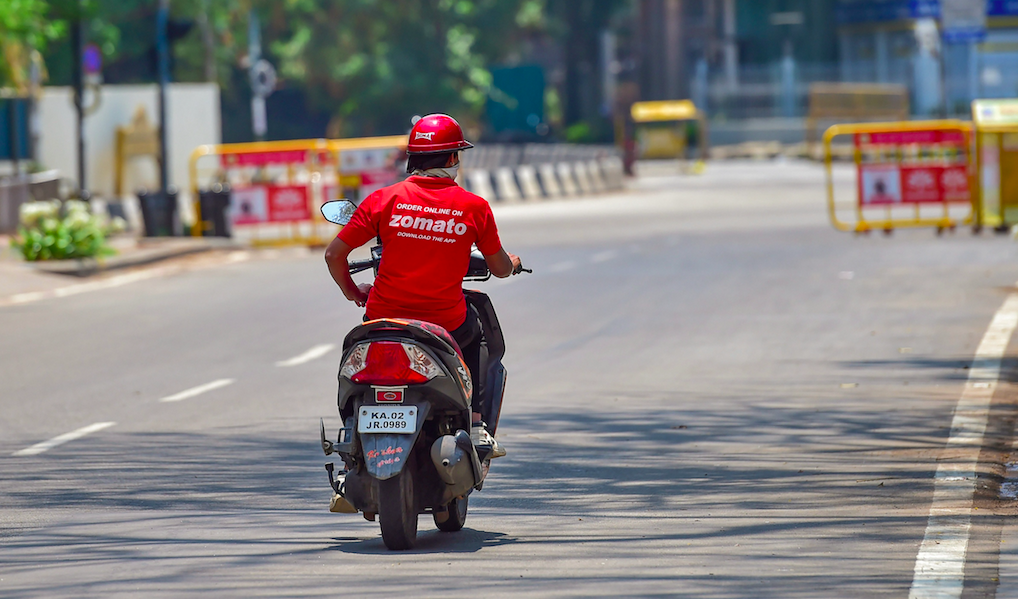A few days ago, I reported a story for Entrackr about the life of one Zomato delivery worker in Gurgaon. I tailed him as he went about his day delivering orders, calculating the kilometres he rode for and the money he made at the end of his ten-hour long shift.
The story blew up. In this piece, I document some aspects that were left out of the first story to keep it under a particular word limit.
§
Sumit Kumar, the 31-year-old Zomato delivery worker, has been with the company for four years. In that sense, he is one of the “older” delivery workers attached to the company, because by Zomato’s own estimates an average delivery person’s tenure with the company is around a year.
I met him in the early hours of a Sunday morning in early August at the Sector 31 market in Gurgaon where he had come to pick an order from a restaurant. However, before he could get the order, it started raining incessantly and he took shade under a shop’s elongated roof. That allowed me to approach him and convince him to let me follow him for the day. His hesitation was clear to see, but he agreed.
Dignity
As the rain slowed down a bit, he picked up the order and left to deliver it. But before we could go far, the intensity of the rain increased yet again and we took shelter at a security post outside one of Gurgaon’s many flashy bungalows.
The person who had placed the order was calling Kumar repeatedly. He was hungry. Even though Kumar tried to explain to him many times that it was raining too heavily, the person at the other end would have none of it.
Here’s an exchange between them that happened over the call:
Customer: What is the delay about? It’s already been 25 minutes.
Kumar: I understand, sir. But please do understand that it is raining too much right now.
Customer: So what do I do? So many other delivery workers are delivering food. Wear your raincoat and come. I don’t care if the rain is too much. I want my food.
Kumar: Okay sir, I am leaving right away.
As soon as he started his bike and started to proceed towards the customer’s address, the person cancelled the order.
Kumar turned towards me and said: “Now I can keep this food, the company won’t say anything. But after people behave with you like this, nothing seems worth it. Sometimes, there’s no dignity in this job. People don’t talk to us like we’re humans.”
Tips
If you read the story published on Entrackr, you’ll know that on the day I spent tailing him, Kumar completed 12 orders after travelling for more than 100 kilometres. At the end, he made Rs 787, of which Rs 200 were given as incentive to him by Zomato for completing 12 orders.
Many of you have since reached out to me asking how tips given by customers factor in. And admittedly, my original story did not deal with this subject when it should have.
Tips work in two ways: Zomato has an in-app tipping option and alternatively, customers can give tips in cash to the delivery worker in person.
On Sunday, none of the 12 customers gave a tip to Kumar. And he said that this was a common occurrence. On an average, one out of 15-20 people tip, he told me.
More people should tip. But I’m also of the belief that tipping should also not be totally normalised, because that could allow the company to evade its responsibility of fairly compensating its delivery “partners”. It’s a complex debate, and there are far more qualified people than me to talk about it.
Many also asked me if the tips given to delivery workers via the app are given to them entirely or if the company keeps a cut of that. I don’t have any evidence for it (since no one tipped), but Kumar said he gets the exact amount credited to his account.
Daily difficulties
We were on the road for a little over ten hours as he delivered one order after the other. I was on a Honda Activa right behind him. And at the end of the hours-long shift, I had terrible pain in my lower back.
I asked him how he managed to do it every day.
That’s when I learnt that for the last two years, he has been struggling with acute back pain. But he has never consulted a doctor fearing a long hospital bill.
But he has to keep on going, irrespective of the pain.
Soumyarendra Barik is a journalist who reports on the intersection of tech, policy, and society with a particular interest in labour issues.
This piece was first published on the author’s blog Tech Line. Read it here.
Featured image credit: PTI

